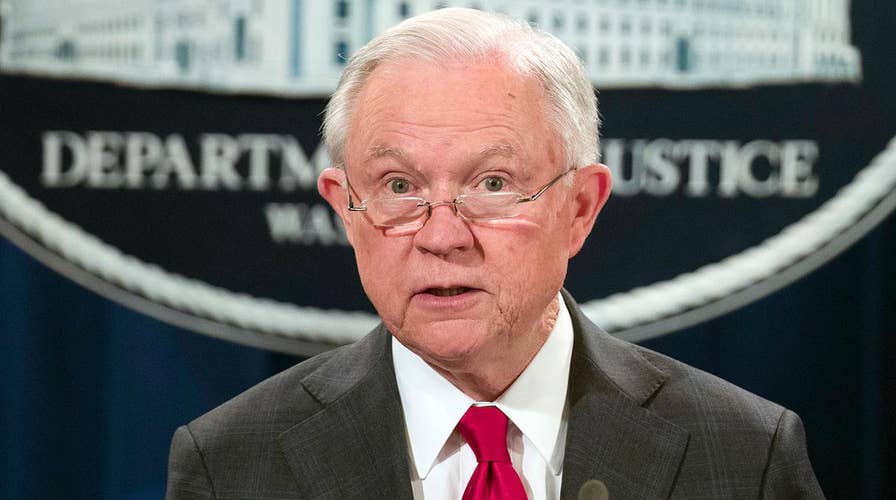Attorney General Jeff Sessions resigns
Attorney General Jeff Sessions submitted his letter of resignation. John Roberts reports.
The C-40 military jet carrying then-Attorney General Jeff Sessions and senior staff had just lifted off the runway at Boston’s Logan airport on Oct. 29 when the engine shuddered and the plane hit the ground with a thud. The jet had hit a flock of birds, remnants of which were splattered across the windshield. The two senior aides in the front cabin were pale and shaken. So was I, a reporter covering him that week.
Jeff Sessions never flinched.
That was typical, said top aides. Throughout his 21-month roller-coaster ride as the nation’s top law enforcement official, Jeff Sessions had not flinched. Whatever his fury or frustration about President Trump’s humiliating tweets and barbs about him, whatever pain he felt, had remained private.
Sessions kept his head down and did his job as he defined it – upholding the Constitution and the rule of law, bringing down crime, and protecting freedom of speech and expression – especially religious expression. This was the president’s agenda, he told me that day on the plane, and he felt “privileged and honored to be able to implement it.”
This, too, was Jeff Sessions – discreet, loyal perhaps to a fault, and utterly mission-driven.
That mission ended abruptly and brutally on Wednesday, less than a day after the midterm elections returned control of the House of Representatives to the Democrats but kept Republicans in control of the Senate.
President Trump had made no secret of his desire to fire Sessions earlier. But doing so, the president’s top aides warned, would have left him vulnerable to charges that he was obstructing justice by trying to shut down Special Counsel Robert Mueller’s probe of Russian interference in the 2016 presidential election and possible collusion between Russia and the Trump campaign.
Firing Sessions before the midterms might have hurt the election prospects of Republican candidates locked in close races. So President Trump waited, lashing out occasionally in tweets and impromptu complaints about Sessions. The former Republican senator from Alabama had been the first senator to endorse Trump’s then-unlikely bid for the presidency and gave up a safe Senate seat to join the chaotic Trump administration.
Sessions had betrayed him, Trump often asserted, by recusing himself from any supervisory role or other involvement in the Russia investigation, on the advice of his agency’s ethics officers.
There was no possibility of redemption for this original sin in President Trump’s eyes. Sessions, the fourth person whom Trump had thanked on election night, suddenly went from being a “great man” to being called a “traitor,” an “idiot” and a “dumb Southerner” by the president. Barely a day passed without a Trumpian blast.
So my week at the Justice Department with Sessions had been a political death watch. Unless Democrats gained control of the Senate and made it impossible for the president to confirm a replacement for the attorney general, Sessions’ termination was inevitable, his senior staff knew. What had been unclear was precisely when and how it would end.
Ever the courtly southerner, Sessions had tried to avoid an ugly scene and chaos in his vital agency. He had hoped to leave with both sides’ dignity intact. About a month ago, he had quietly sent word to the White House that he, too, had had enough. If Trump wanted him to resign after the midterms, he would do so at the time of the president’s choosing.
When Trump’s aides did not reply, Sessions made a similar overture to Vice President Mike Pence. Silence.
Still, senior aides to Sessions were taken back when they learned that White House Chief of Staff John Kelly had called their boss shortly before Trump’s post-election press conference to demand his resignation – effective immediately. Sessions was not told that his own chief of staff, Matthew Whitaker, would be his temporary replacement and assume supervision of the Mueller probe.
Neither the liberals nor Trumpian conservatives had been fond of Jeff Sessions.
Trump supporters argued that Sessions should have prosecuted Hillary Clinton and done more to investigate possible perjury and misuse of surveillance warrants to spy on former Trump campaign adviser Carter Page.
Liberals hated Sessions’ hard-nosed “law and order” policies and his longstanding support for the harsh immigration measures that Trump had promoted – the separation of refugee and illegal immigrant families at the southern border, and threats to cut funds to “sanctuary” cities. Reports of latent racism never truly subsided.
But in the end, liberals and conservatives praised Sessions for having scrupulously adhered to the rule of law by protecting the Mueller inquiry. On at least two occasions Sessions had defended his department’s essential independence and its personnel against President Trump’s attacks.
Sessions had not permitted the White House to turn the Justice Department into its tool. Whatever Sessions’ other failings, said Lawrence Goldstone, a writer about justice and the Constitution, Sessions had prevented President Trump from using the Justice Department to pursue and enact a political agenda.
“That would have been a perversion of justice,” Goldstone said.
Sessions paid a heavy price in losing the job he had wanted for so long. But I’m sure that he would consider having protected the rule of law and the Constitution from political manipulation a proud political epitaph.









































